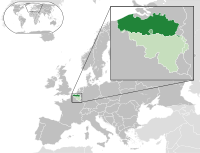De Vlaamse Leeuw
| English: The Flemish Lion | |
|---|---|
 "De Vlaamse Leeuw" | |
Regional anthem of Flanders | |
| Lyrics | Hippoliet Van Peene, 1847 |
| Music | Karel Miry |
| Adopted | 1973 |
| Audio sample | |
Orchestral instrumental rendition in G major | |
"De Vlaamse Leeuw" (Dutch: [də ˈvlaːmsə ˈleːu] ⓘ; The Flemish Lion) is the official anthem of Flanders, a region and community in Belgium.[1][2]
Composition

The words of this anthem were written in July 1847 by Hippoliet Van Peene (1811–1864) who was clearly inspired by the song Sie sollen ihn nicht haben, / den freien Deutschen Rhein, / So lang sich Herzen laben / An seinem Feuerwein (They must never get our free German Rhine, As long as hearts relish its fiery wine) by the German author Nikolaus Becker.
The music, by Karel Miry (1823–1899), is apparently influenced by Robert Schumann's Sonntags am Rhein.
Like France's Marseillaise, De Vlaamse Leeuw is a nationalist battle song. Franco-Belgian political tension in the mid-19th century made the Flemish public mood ripe for such an expression of regional feeling. At the time, it was not meant as anti-Belgian (as it often came to be seen by Flemish separatists and their Belgicist opponents), for the "enemy" it refers to is Belgium's southwestern neighbour France, as in the 1302 Battle of the Golden Spurs.
Around 1900, the anthem was in general use among Flemish militants.
On 6 July 1973, a decree by the then Cultural Council for the Dutch Cultural Community (the precursor of the present Flemish Parliament) proclaimed the first two stanzas to be the official national anthem of Flanders. The text and musical notation were officially published on 11 July 1985.
Lyrics
Only the first two stanzas and their refrains are performed.
| Flemish original | English translation |
|---|---|
I |
I |
See also
- De Leeuw van Vlaanderen (The Lion of Flanders, synonymous title, but also the nickname of its hero, the medieval Count Robert III of Flanders and the title of the Flemish national epic by Hendrik Conscience).
- Flag of Flanders, featuring a lion
- La Brabançonne
- Le Chant des Wallons
References
- ^ De zwarte Vlaamse Leeuw: een "collaboratievlag" of niet?
- ^ De Vlaamse Leeuw
- ^ "De Vlaemsche leeuw". lib.ugent.be. Retrieved 2020-08-21.
External links
- The Regional Government of Flanders has a page with information on the anthem, including a vocal recording (Dutch)
